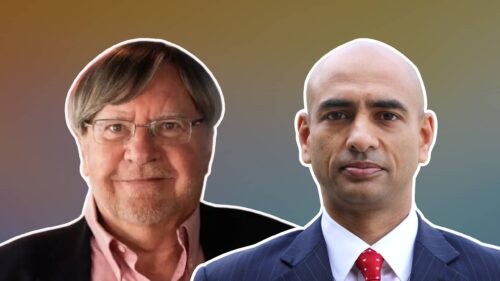US President Donald Trump’s biggest strategic mistake when he was in the White House was one of entropy.
As physicists explain, a closed system invariably tends towards disorder. In more common political terms: Since the public agenda of viable issues is limited, if the government removes foreign policy from the main focus of attention, it opens space for the emergence of all the domestic issues that have never been resolved.
Trump’s priority was isolationism: closing the country to immigrants, imposing tariffs on imports, disengaging from NATO, and telling Russian President Vladimir Putin, Chinese President Xi Jinping, North Korean supreme leader Kim Jong Un and other satraps that they could do whatever they wanted.
The consequence of global withdrawal was the emergence of internal conflicts over immigration, race and police brutality, climate, sex and gender, religion, family and education, public health, gun control, voting rights, and so on. Of course, the unrest was aggravated by Trump’s racism and incompetence, as well as by the imbalances of the institutional system, but the strategic error is obvious.
For a great power like the United States, the most successful example of good government is the first Roman emperor, Caesar Augustus. Historian Michael Rostovtzeff said that “the real diarchy” was not between the Emperor and the Senate (since the Emperor prevailed), but between the central government and the provinces and cities. The government should have two focuses: The central government should focus on public finances, defense and foreign policy (the opposite of what Trump did) while many smaller-scale matters should be widely decentralized to territorial units: the provinces or, in the case of the US, the states and cities.
In some ways, this was the model of government used by Presidents Franklin Roosevelt, Harry Truman and Dwight Eisenhower. They focused on World War II and the Cold War while declining to interfere much in the internal affairs of states and giving ample space to the private economy. One of the costs was the territorial fragmentation of social policies, including the survival of racial segregation in some southern states.
Again, this was the model for the second Cold War against the Soviet Union launched by Ronald Reagan and George H. W. Bush. The US victory in this contest created a relatively short period of world hegemony, the last victory of which was the 1990 Persian Gulf War. President Bill Clinton continued an internal policy of decentralization until the end of the century, again at the expense of social policies on welfare and family issues.
The main risk of this approach is that, in the long term, it can produce imperial overload. Eisenhower already warned about this in 1961 when he denounced the excessive power of the military-industrial complex in his farewell speech. His successor, John F. Kennedy, initiated a major turnaround: He began a troop withdrawal from Vietnam, tried to stop secret CIA operations in Cuba and other countries, and reached several agreements with the Soviet Union to reduce nuclear bombs — but he was not allowed to go any further. Immediately, protest movements began to emerge over civil rights and the forced recruitment of young people to go to wars of aggression in Vietnam, Cambodia and Laos. Military defeats abroad generated political defeats at home: neither Presidents Lyndon Johnson, Richard Nixon, Gerald Ford nor Jimmy Carter completed two terms.
The cycle began again after the September 11, 2001 al-Qaeda terrorist attacks. The government of President George W. Bush embarked on a series of “preventive” wars, including a phantasmagorical “Global War on Terrorism,” which could have excited patriotic emotions capable of calming internal tensions. However, even though the army was now made up of volunteers and professional soldiers rather than conscripts, the US suffered a series of humiliating military defeats in Iraq, Afghanistan, Libya and Syria.
Trump’s challenge was a reaction to all these costly failures. But his entropic isolationism opened space for the expression of a wide internal discontent and a diversity of demands and protests, a high political polarization between the two parties and a blockage between the presidency and Congress.
These repeated cycles in American politics show a permanent dilemma: If the empire develops an aggressive foreign policy, it can gain a certain international dominance but also an overload of military defeats and financial deterioration. If, on the contrary, isolationism prevails, it can provide savings in defense but also internal disorder and chaos.
The way out of the dilemma could be a corrected diarchy. A great power has to prioritize foreign policy and defense, yes, but not multiple aggressive wars. It needs to maintain and expand the number of its allies, which can help reduce deficits and defeats and promote international cooperation, open trade and peace. At the same time, an internal decentralization on controversial issues, such as some “woke” issues right now, could decrease national polarization.
Trump has learned nothing from his experience. Should she become president instead, Vice President Harris will have to reflect and plan carefully before acting.
[The author’s blog first published this piece.]
The views expressed in this article are the author’s own and do not necessarily reflect Fair Observer’s editorial policy.
Support Fair Observer
We rely on your support for our independence, diversity and quality.
For more than 10 years, Fair Observer has been free, fair and independent. No billionaire owns us, no advertisers control us. We are a reader-supported nonprofit. Unlike many other publications, we keep our content free for readers regardless of where they live or whether they can afford to pay. We have no paywalls and no ads.
In the post-truth era of fake news, echo chambers and filter bubbles, we publish a plurality of perspectives from around the world. Anyone can publish with us, but everyone goes through a rigorous editorial process. So, you get fact-checked, well-reasoned content instead of noise.
We publish 2,500+ voices from 90+ countries. We also conduct education and training programs
on subjects ranging from digital media and journalism to writing and critical thinking. This
doesn’t come cheap. Servers, editors, trainers and web developers cost
money.
Please consider supporting us on a regular basis as a recurring donor or a
sustaining member.
Will you support FO’s journalism?
We rely on your support for our independence, diversity and quality.










Comment